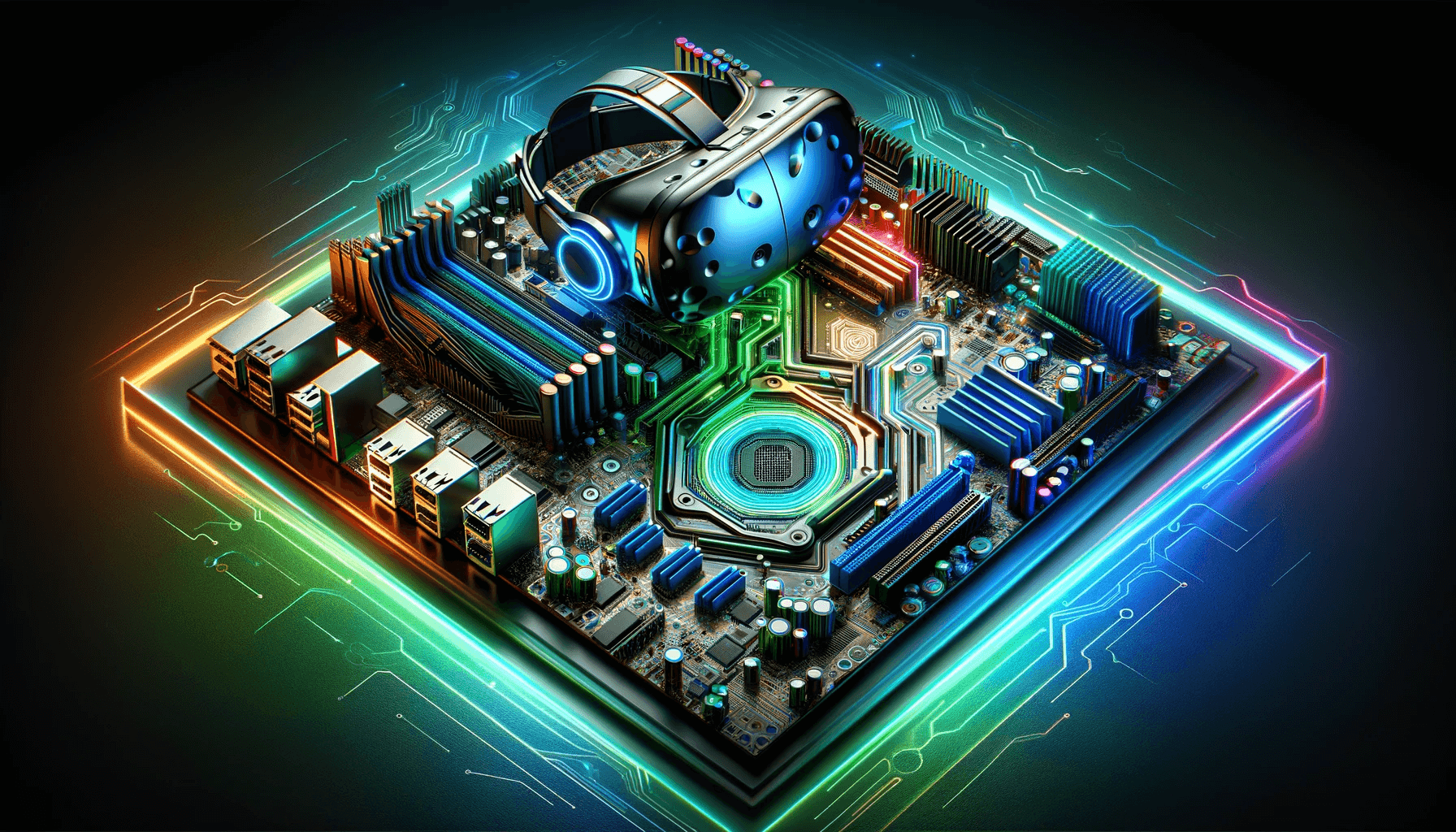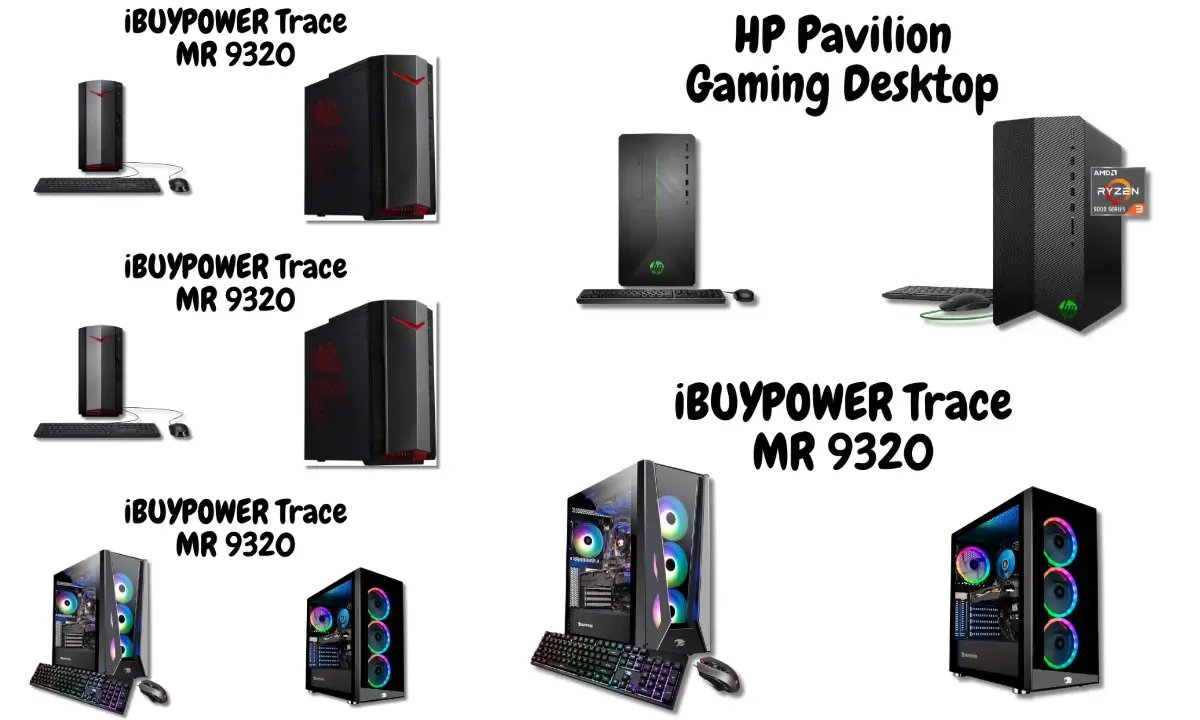Virtual Reality (VR) gaming has changed the way we experience digital worlds, offering an incredibly immersive experience. To fully enjoy VR gaming, having the right hardware is crucial, and at the heart of this hardware setup is the motherboard. The motherboard is a vital component that ensures all parts of your gaming system work together seamlessly.
A good motherboard is the backbone of your PC. It connects and coordinates essential components like the CPU, GPU, RAM, and storage devices. This coordination is vital for smooth data flow, which is especially important in VR gaming where latency and frame rates can significantly affect your experience.
In 2024, there are many advanced motherboards available that are perfect for VR gaming. This article will help you explore these options and find the best motherboard for your needs. Whether you’re building a new gaming PC or upgrading your current one, choosing the right motherboard is key.
We’ll look at the essential features of a VR-ready motherboard. These features include strong support for powerful processors, high memory capacity, and advanced connectivity options. We’ll also discuss specialized VR enhancements that can improve your gaming experience. By the end of this article, you’ll know how to pick a motherboard that meets the current demands of VR gaming and is ready for future VR advancements.
Table of contents
The Evolution of VR Gaming and Motherboard Technology
VR gaming has come a long way, with more realistic and immersive experiences. The heart of this evolution is the technology behind it, especially motherboards. A good motherboard ensures that all your gaming components work together seamlessly. For VR gaming, this harmony is even more crucial.
Read More Exploring 4GB RAM PC Games Without Graphics Card: Maximizing Gaming on Low-Spec Systems.
Key Features to Look for in a VR Gaming Motherboard
When searching for the best motherboard for VR gaming, there are several features to consider:
- Processor Compatibility: It’s essential that the motherboard supports the latest processors, such as the 9th and 8th Gen Intel® Core™ Processors. This compatibility ensures that the motherboard can handle the intensive processing demands of VR games.
- Memory Support: Look for motherboards offering Dual Channel Non-ECC Unbuffered DDR4, with at least 4 DIMMs. Adequate RAM support, preferably 16GB or more, is vital for smooth VR gaming, as it allows for efficient data processing and a lag-free experience.
- Expansion Slots and Connectivity: A VR-ready motherboard should have ample USB 3.0 ports and PCIe ports for connecting VR headsets and accessories. The presence of these ports ensures that you can connect the latest VR devices without any compatibility issues. Additionally, some motherboards also offer built-in Wi-Fi 6, which is beneficial for wireless VR devices.
- VR-Ready Features: Some motherboards are specifically designed with VR in mind, featuring enhancements like a new 10+2 Phases Digital PWM Design and NVMe PCIe Gen3 x4 22110 M.2 connectors for faster data transfer and improved performance. These features contribute to a more immersive and responsive VR gaming experience.
For more detailed information and to explore various motherboard options, you can visit the provided links:
- Gigabyte Z390 UD (rev. 1.1) Key Features
- Next-Gen VR Gaming | Solution – GIGABYTE Global
- Reddit Discussion on VR Ready Motherboards
- Building the Best PC for Virtual Reality – Logical Increments
- Quora Discussion on VR Gaming PC Components
Top 5 Motherboard Picks for VR Gaming in 2024
Choosing the right motherboard can be daunting. Here are our top picks for the best motherboard for VR gaming in 2024:
- Best Overall Motherboard for VR Gaming
- ASUS AM4 TUF Gaming X570-Plus
- This ASUS motherboard is highly recommended for AMD Ryzen builds, especially for VR gaming. It offers a great balance of price and performance, making it an excellent choice for most VR gamers.
- More about ASUS AM4 TUF Gaming X570-Plus
- ASUS AM4 TUF Gaming X570-Plus
- Best Budget-Friendly Motherboard for VR Gaming
- ASRock B660M Pro RS LGA1700
- For those on a budget, the ASRock B660M Pro RS LGA1700 stands out. It offers solid VR gaming performance without a high price tag.
- More about ASRock B660M Pro RS LGA1700
- ASRock B660M Pro RS LGA1700
- Best High-Performance Motherboard for VR Gaming
- Gigabyte Z790 Aorus Xtreme
- If you’re seeking the ultimate VR gaming experience, the Gigabyte Z790 Aorus Xtreme offers top-tier performance and features.
- More about Gigabyte Z790 Aorus Xtreme
- Gigabyte Z790 Aorus Xtreme
- Best AMD Motherboard for VR Gaming
- MSI B450M PRO-VDH MAX AM4
- AMD enthusiasts will appreciate the MSI B450M PRO-VDH MAX AM4 for its compatibility and performance tailored for AMD processors.
- More about MSI B450M PRO-VDH MAX AM4
- MSI B450M PRO-VDH MAX AM4
- Best Motherboard for VR Gaming with Future-Proof Features
- ASRock Z690 Taichi
- Looking ahead, the ASRock Z690 Taichi includes features that will keep your VR gaming setup relevant for years to come.
- More about ASRock Z690 Taichi
- ASRock Z690 Taichi
These motherboards have been selected based on their compatibility, performance, and specific features that enhance VR gaming experiences. Depending on your specific needs and budget, one of these motherboards should be an ideal choice for your VR gaming setup in 2024.
Installation Tips for VR Gaming Motherboards
Installing a motherboard might seem intimidating, but it’s quite straightforward. Here are some tips:
- Read the Manual:
- Every motherboard comes with a specific manual. It’s crucial to start by reading this manual to understand the layout, features, and specific installation instructions for your motherboard model.
- Building the Best PC for Virtual Reality – Logical Increments
- Proper Handling:
- Motherboards are sensitive to static electricity. It’s recommended to use an anti-static wrist strap or ground yourself before handling.
- Handle the motherboard by its edges and avoid touching the circuits or components directly.
- How to build a VR-ready PC – CNET
- Align Correctly:
- Ensure that the motherboard aligns with the standoffs in the PC case. This prevents the motherboard from touching the case directly, which could cause a short circuit.
- Check the alignment of the I/O ports with the case’s I/O shield.
- Futureproof Your Gaming Experience: A Guide to Building a VR Ready PC – VR Wave
- Connect Everything:
- Double-check all connections, including power cables, data cables, and peripherals. Ensure that the power supply is adequate for your motherboard and other components.
- Pay special attention to the CPU power connector and the main motherboard power connector.
- Building a PC for VR gaming – YouTube
- Additional Tips:
- Test Before Full Installation: It’s a good practice to do a basic external build test before installing the motherboard in the case. This means connecting the essential components (CPU, RAM, GPU) and testing if the system boots up.
- Cable Management: Proper cable management is essential not only for aesthetics but also for airflow within the case.
- Updating BIOS: After installation, check if your motherboard’s BIOS is up to date. This ensures compatibility with the latest hardware and software.
These tips should provide a comprehensive guide for installing a VR gaming motherboard, ensuring a smooth and successful setup. For more detailed information and visual guides, you can visit the provided links.
The Future of Best Motherboard For VR Gaming
The future of VR gaming is exciting, with advancements in both VR technology and motherboards. We’re looking at faster processing speeds, more immersive VR experiences, and motherboards that are increasingly VR-optimized. The best motherboard for VR gaming will continue to evolve, offering even more features that enhance VR gaming.
- Advancements in VR Technology:
- VR technology is rapidly evolving, with major companies like PlayStation and Meta leading the charge. The focus is on creating more immersive and interactive VR experiences, blurring the lines between reality and fiction.
- Is the Future of VR Gaming Promising or Fading Away?
- Integration of AI in VR Gaming:
- Artificial Intelligence (AI) is expected to play a significant role in enhancing AR/VR gaming technology. AI can make VR environments more realistic and responsive, providing a more immersive gaming experience.
- The Advent and Future of AI in AR/VR Gaming Technology
- More Realistic VR Gaming Experiences:
- Future VR gaming is likely to incorporate more realistic elements, making the gaming experience feel more real. This includes improved graphics, better motion tracking, and more interactive VR environments.
- The Future of VR Gaming – Fierce PC Blog
- Immersive and Connected VR Gaming Communities:
- The role of community and online connectivity in VR gaming is set to become more prominent. This means more multiplayer VR games and virtual spaces where players can interact in real-time.
- The Future of Virtual Reality in Gaming – Draw & Code
- Next-Generation VR Headsets and Motherboards:
- The upcoming generation of VR headsets promises to elevate the gaming experience with cutting-edge technology. Correspondingly, motherboards are being optimized to support these advancements, focusing on faster processing speeds, better connectivity options, and VR-specific features.
- The Future of VR Gaming: What To Expect In 2024 – Tech4Gamers
In summary, the future of VR gaming is all about creating more realistic, immersive, and connected experiences. Motherboards will play a crucial role in this evolution, as they are being designed to support the increasing demands of VR technology. This synergy between VR hardware and motherboard technology is what will drive the next phase of VR gaming.
Final Thoughts
Choosing the best motherboard for VR gaming is crucial for an immersive and smooth VR experience. Whether you’re looking for overall performance, budget-friendly options, high-end gaming, or the best AMD motherboard for VR gaming, there’s something for everyone in 2024. Remember, the right motherboard can significantly elevate your VR gaming experience.














